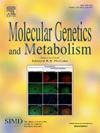Clinical, biochemical and cell biological characterization of KIDAR syndrome associated with a novel AP1B1 variant
IF 3.5
2区 生物学
Q2 ENDOCRINOLOGY & METABOLISM
引用次数: 0
Abstract
Adaptor protein (AP) complexes play key roles in escorting transmembrane proteins to various intracellular destinations, including the trans-Golgi compartment, secretory vesicles, and the plasma membrane. The AP-1 complex is heterotetrametric, comprised of four individual subunits: β1, γ1, σ1, and μ1, and encoded by separate genes that interact selectively with distinct cargo proteins. When AP-1 complex assembly is impaired due to loss-of-function variants in any of its component genes, clinical consequences related to altered transmembrane protein trafficking may result. Biallelic pathogenic variants in the β1 subunit (AP1B1) are associated with a unique clinical phenotype including keratitis, ichthyosis, and deafness with autosomal recessive inheritance, the KIDAR syndrome. This disorder is further characterized by enteropathy, failure to thrive, neurodevelopmental delays, endocrinopathies, and abnormalities in copper (Cu) metabolism, the latter reflecting impact on intracellular trafficking of two transmembrane Cu-transporting ATPases, ATP7A and ATP7B. Ten individuals with KIDAR syndrome have been reported to date. Here we describe the clinical, biochemical, and cell biological effects associated with a novel homozygous AP1B1 variant, (NM_001127.4: c.667delC, p.Leu223Trp*fsTer38) in a previously unreported individual. Our findings expand the phenotypic spectrum of this rare inherited illness, provide new data related to its cell biological effects, and offer insights relevant to potential treatment.
与新型AP1B1变异相关的KIDAR综合征的临床、生化和细胞生物学特征
接合蛋白(AP)复合物在护送跨膜蛋白到达各种细胞内目的地(包括反式高尔基腔室、分泌囊泡和质膜)中起着关键作用。AP-1复合物是异四聚体,由四个独立的亚基组成:β1、γ1、σ1和μ1,由不同的基因编码,选择性地与不同的货物蛋白相互作用。当AP-1复合物的组装由于其任何组成基因的功能变异丧失而受损时,可能会导致与跨膜蛋白运输改变相关的临床后果。β1亚基(AP1B1)的双等位致病变异与一种独特的临床表型相关,包括角膜炎、鱼鳞病和伴有常染色体隐性遗传的耳聋,即KIDAR综合征。这种疾病的进一步特征是肠病、发育迟缓、神经发育迟缓、内分泌失调和铜代谢异常,后者反映了两种跨膜铜转运酶ATP7A和ATP7B在细胞内运输的影响。迄今为止已报道了10例KIDAR综合征患者。在这里,我们描述了一种新的纯合AP1B1变异(NM_001127.4: c.667delC, p.Leu223Trp*fsTer38)在以前未报道的个体中的临床、生化和细胞生物学效应。我们的发现扩大了这种罕见遗传性疾病的表型谱,提供了与其细胞生物学效应相关的新数据,并提供了与潜在治疗相关的见解。
本文章由计算机程序翻译,如有差异,请以英文原文为准。
求助全文
约1分钟内获得全文
求助全文
来源期刊

Molecular genetics and metabolism
生物-生化与分子生物学
CiteScore
5.90
自引率
7.90%
发文量
621
审稿时长
34 days
期刊介绍:
Molecular Genetics and Metabolism contributes to the understanding of the metabolic and molecular basis of disease. This peer reviewed journal publishes articles describing investigations that use the tools of biochemical genetics and molecular genetics for studies of normal and disease states in humans and animal models.
 求助内容:
求助内容: 应助结果提醒方式:
应助结果提醒方式:


